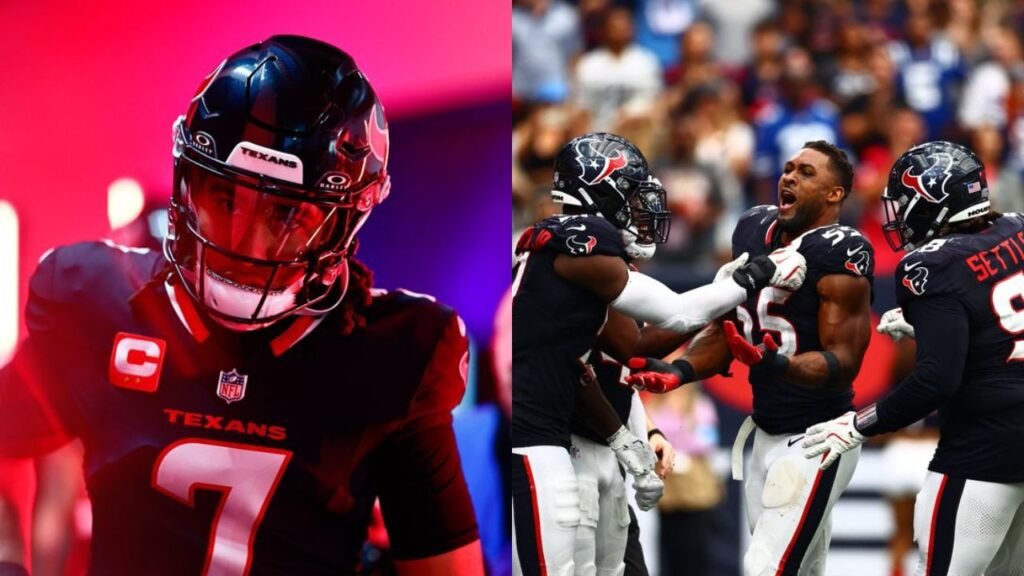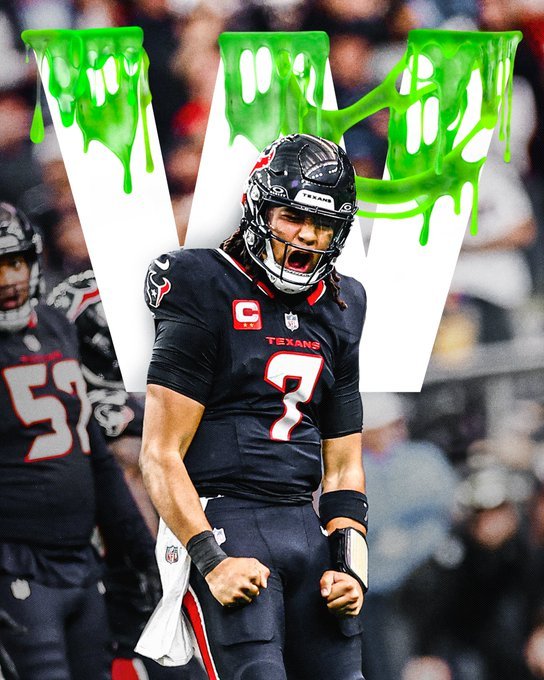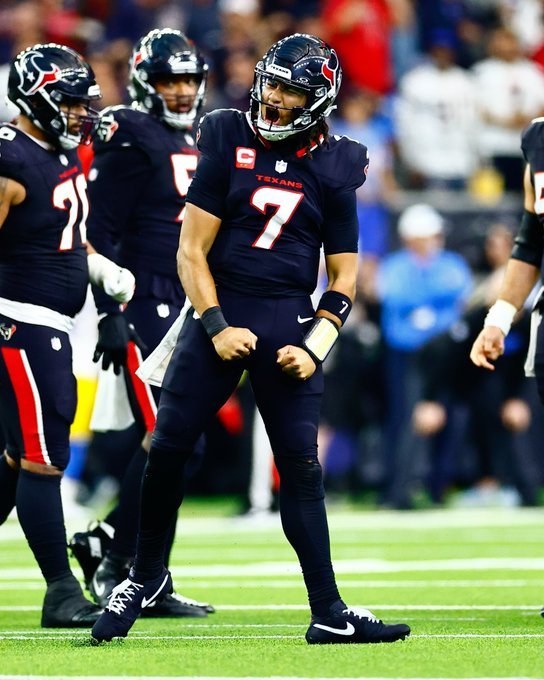Texans Make Statement With Dominant Defensive Performance In Wild-Card Win
- Leave a Comment
- William D
- January 12, 2025

The Houston Texans defeated the Los Angeles Chargers 32–12 in a thrilling Wild-Card playoff game, demonstrating their superiority on both sides of the ball. The Chargers’ offense was stifled throughout the game, but the Texans’ defense really stole the show and left a lasting impression in the postseason.
The Texans’ defensive masterwork would be remembered for their career-high four interceptions of Chargers quarterback Justin Herbert, one of which was returned by a touchdown.
Under the direction of head coach DeMeco Ryans, the Texans defense carried out a strategy centered on stopping the run and making the Chargers one-dimensional. The Texans were able to break Herbert’s rhythm and apply continuous pressure by successfully neutralizing the ground game.
Herbert only completed 3 of 14 passes for 112 yards under stress as a result of the constant defensive pressure, and he committed numerous turnovers that ultimately ended the Chargers’ chances of progressing.
One of the main reasons for the Texans’ outstanding performance was their capacity to produce turnovers. They became the fifth team in NFL history to post four sacks in a playoff game in addition to four interceptions. The defense’s readiness and performance were demonstrated by their capacity to wreak havoc and seize openings.
Security One of the game’s pivotal plays was Eric Murray’s interception return for a touchdown in the third quarter, which cemented the Texans’ overwhelming advantage and further demonstrated the value of the defense.
The Chargers were forced into crucial errors by the Texans’ defense, which prevented them from gaining momentum throughout the game. The defense was unrelenting in preventing the Chargers from scoring, from Derek Barnett’s pressure to force a poor pass to Stingley’s key interceptions in the fourth quarter.
In addition to dominating, the Texans’ defense set the tone for the entire team, demonstrating their ability to step up when it mattered most during the postseason. This win will be remembered as one of the best defensive displays in the history of the playoffs.

Dominance on the defensive
Following the Houston Texans’ resounding 32-12 Wild-Card victory over the Los Angeles Chargers, coach DeMeco Ryans had nothing but praise for his defense. Ryans was quick to praise his defensive unit’s unwavering work, describing their performance as “dominant” and a reflection of the team’s fundamental values.
“Today, they dominated our defense,” Ryans remarked. “We want to be like that.” The Texans’ defense established the tone early on by applying constant pressure to the Chargers’ offense and forcing turnovers that were crucial to winning the game.
From the beginning, it was obvious that the Texans’ defense would halt the run and force the Chargers to play a one-dimensional game. The Texans let their defensive line cause havoc and interfere with quarterback Justin Herbert by limiting the Chargers’ rushing game.
The Texans were able to put Herbert in awkward circumstances by suppressing the run game and making him rely on his throwing game to move the ball. The Chargers’ offensive output was eventually constrained by this defensive scheme, and the Texans took advantage of their errors.
Herbert was totally overpowered by the Texans’ defense, which did more than just restrict him. The Chargers quarterback’s career-high four interceptions came from the defense. These turnovers were crucial because they gave the Texans momentum and stopped the Chargers’ drives.
When safety Eric Murray intercepted Herbert late in the third quarter and returned the pass for a score to increase the Texans’ lead, it was the high point of these interceptions. The Texans were able to seize charge of the game and capitalize on every opportunity in that pivotal time.
This outstanding defensive display was a part of an uncommon collection of accomplishments rather than a coincidence. In a postseason game, the Texans became the fifth team in NFL history to record four sacks, four interceptions, and an interception return for a touchdown.
The 2002 Tampa Bay Buccaneers, the 2000 Baltimore Ravens, and the 1989 San Francisco 49ers were the only teams to achieve this accomplishment and all went on to win the Super Bowl. The Texans have solidified their status as a defensive powerhouse that can make a deep postseason run by entering this elite club.
MONEY MIX 💰 pic.twitter.com/LQkQiTV0LD
— Houston Texans (@HoustonTexans) January 12, 2025
Important Defensive Plays
A team effort that demonstrated the value of complementary football—where the defensive line and secondary worked in unison—fueled the Houston Texans’ defensive success. Will Anderson, a defensive end, discussed the coordination between the rush and coverage, highlighting how both elements of the defense worked together.
“Rush and cover, tying in together,” gave Anderson’s explanation. “All we were doing was hurrying.” We were only able to make a few plays, force some turnovers, and take the ball away because they were slick in coverage.” Few could have foreseen the Texans’ performance because of their cohesiveness, which enabled them to consistently put pressure on Chargers quarterback Justin Herbert.
The Texans defense made Herbert uneasy on almost every dropback, thus pressure was a recurring theme throughout the game. The Texans forced Herbert into poor passes and tough choices on half of his dropbacks, according to Next Gen Stats.
Herbert was under pressure and only completed 3 of 14 passes for 112 yards as he tried to find his rhythm with opponents in his face. The Chargers’ offensive flow was interrupted by the Texans’ unrelenting pressure, which resulted in crucial turnovers and lost opportunities for Los Angeles.
The game-changing turnover that resulted from defensive end Derek Barnett’s pressure late in the third quarter was one of the game’s pivotal plays. Barnett’s pressure forced Herbert to attempt a pass with just 21 seconds left, but it soared out of reach of his intended target, wide receiver Ladd McConkey.
Security Eric Murray caught the ball and returned it for a score because he was at the right place at the right moment. Murray’s pick-six gave the Texans a decisive 20-6 lead and demonstrated how the defense can take advantage of errors to produce plays that change the momentum.
Cornerback Derek Stingley made a crucial interception in the fourth quarter to seal the victory as the game was coming to an end. Stingley’s prompt pick on a short and deep pass made sure the Texans wouldn’t let the game slip away as the Chargers were looking for a comeback.
In addition to ending the Chargers’ chances of a comeback, the interception cemented Stingley’s standing as one of the best cornerbacks in the league. His performance, the defensive line’s pressure, and the complementing coverage demonstrated the Texans’ defense’s ability to function as a cohesive unit when it mattered most.
[W]ILD CARD ROUND ✅ pic.twitter.com/yoNvwFkyCr
— Houston Texans (@HoustonTexans) January 12, 2025
The Houston Texans’ offense struggled to produce consistently throughout the first few drives of their Wild-Card playoff game against the Los Angeles Chargers. On their first drives, the offense was put in a number of difficult positions, including three punts, an interception, and a lost fumble, while the defense was stepping up to keep the game within reach.
Nevertheless, the Texans’ defense held firm, enabling the team to remain within striking distance and creating the conditions for a crucial play that would spark the offense and ultimately alter the outcome of the game.
Late in the first half, the Texans’ attack was ignited by a pivotal play. The Texans were behind 6-0 and facing a formidable 3rd-and-16 from their own 1-yard line when C.J. Stroud made a clumsy snap that appeared to be potentially disastrous. However, Stroud remained calm, collecting the ball fast and rolling to his right.
He kept the drive going and changed the momentum with a snap choice, throwing a 34-yard connection to wide receiver Xavier Hutchinson. For the Texans, this play marked a sea change, showcasing Stroud’s composure under duress and his capacity to transform bad situations into opportunities.
Stroud took advantage of the momentum after that unlikely completion by throwing a beautiful 13-yard touchdown pass to Nico Collins, which put the Texans ahead 7–6. Stroud’s brilliant throw and fast thinking ignited the drive, demonstrating his clutch performance. Coach DeMeco Ryans praised Stroud’s tenacity and acknowledged the play’s significance right away.
“The play that he made on the fumbled snap and throw to Hutchinson, that’s the play that just sparked our entire team,” Ryans stated. The offense benefited from Stroud’s zeal, and the team as a whole appeared to unite around him, resulting in a much-needed performance boost.
Stroud said that the play was a game-changing moment for him as much as for the game. “I’m trying to see the defense, and it went through my hands,” Stroud recalled, referring to the mishandled snap. “Fortunately, it immediately bounced back up to me. I attempted to keep the play going.
[Hutchinson] performed admirably. I glanced at the sidelines after we finished, and everyone was there. I was still a little upset with myself, so that made me angry. The team as a whole was invigorated by the play, which not only increased Stroud’s confidence but also gave them a fresh sense of urgency and confidence in their capacity to win.
Stroud’s play was completely different after that. Stroud was 9-of-16 for 83 yards and an interception before to the mishandled snap. He ended the game 13-of-17 for 199 yards and a touchdown with the completion to Hutchinson. The significance of that one play was evident in his ability to bounce back from a poor start and lead the Texans to a 32-6 run after that crucial play.
A whole turnaround was sparked by Stroud’s fumble recovery and subsequent throw to Hutchinson, which also turned out to be the decisive element in the Texans’ historic playoff triumph.

C.J. Stroud’s development during the Los Angeles Chargers Wild-Card playoff game was very outstanding. Stroud had trouble getting into his groove early in the game, giving in to pressure and making mistakes like an interception and a lost fumble. But Stroud’s performance drastically changed following the decisive moment when he recovered a fumbled snap and completed a vital 34-yard throw to Xavier Hutchinson.
Stroud appeared to get a boost from that one move, which boosted his confidence and gave him the ability to dominate the game in a manner that had not been there before. He got more composed and effective in the second half, demonstrating his progress.
Stroud’s stat line prior to the mishandled snap showed his early difficulties. He had thrown an interception and was only 9 of 16 for 83 yards. The Texans were particularly concerned because the defense was doing its hardest to keep the game within reach, and his performance lacked the rhythm necessary to maintain a drive or score points.
But Stroud changed the course after Hutchinson was finished. He had nearly perfect execution in the second half, going 13-for-17 for 199 yards and a touchdown. The significant change in his output showed not only his physical prowess but also his ability to bounce back from setbacks.
Stroud thought on how the play gave him and the team new energy. “I’m trying to see the defense, and it went through my hands,” explained Stroud. “Fortunately, it immediately bounced back up to me. I attempted to keep the play going. [Hutchinson] performed admirably. I glanced at the sidelines after we finished, and everyone was there.
I was still a little upset with myself, so that made me angry. Stroud benefited from his teammates’ excitement, which was evident on the sidelines. Despite beginning as an error, the play served as the impetus for the team’s comeback, and Stroud demonstrated the composure and leadership he would continue to exhibit throughout the game.
Stroud was able to finish the game strong thanks to his renewed enthusiasm and confidence, which affected the squad as a whole. Coach DeMeco Ryans also recognized the importance of that play, pointing out that it ignited the offense and established the game’s tone. “Seeing the way all of our guys responded after he made the play… just outstanding performance by C.J.,” Ryans stated.
Beyond only Stroud’s effort, that one crucial moment had a profound effect on the team as a whole, changing the momentum and ultimately helping the Texans win a historic 32–12 playoff game. Stroud’s improvement during the match demonstrated his capacity to remain composed under duress and his evolution as a leader for Texans going forward.
Along with being a major accomplishment for the team, C.J. Stroud and head coach DeMeco Ryans also celebrated Stroud’s performance in the Texans’ historic 32-12 Wild-Card victory over the Los Angeles Chargers.
With Ryans leading his team to a vital playoffs victory and Stroud displaying poise and development in just his first playoff game, the victory marked a turning point in both of their careers.
Throughout the game, Stroud’s skill and Ryans’ leadership were on full display as they both overcame early setbacks to put up a strong showing. As the third quarterback-coach combination to win a playoff game in their first two seasons together, this victory solidified their place in NFL history.
Stroud and Ryans accomplished this feat, joining a select few head coach-quarterback combinations. Only the New York Jets’ Rex Ryan and Mark Sanchez, as well as the Baltimore Ravens’ John Harbaugh and Joe Flacco, have before achieved this outstanding feat. Harbaugh and Flacco won the Super Bowl in 2012, and Ryan and Sanchez advanced to the AFC Championship Game in 2009.
Both of these teams went on to achieve success. The Texans are a team on the rise with a foundation of leadership and quarterback play that might lead to future playoff runs and title contention. Similar to previous duos, Stroud and Ryans’ postseason victory set the framework for what could be a promising future.
It is impossible to overstate the importance of this accomplishment because it shows how immediately Stroud and Ryans have affected the Texans. Many rookie head coaches and quarterbacks require time to acclimate to the demands of the NFL, but Stroud and Ryans have demonstrated incredible fortitude and maturity.
Their success in their first two seasons says a lot about their readiness, their compatibility, and the promising future this team has ahead of them. With Stroud and Ryans in the forefront, this historic victory is a glaring sign that the Texans have what it takes to be consistent NFL competitors.
For Stroud, the triumph demonstrates not only his skill but also his capacity to perform well under duress. He possesses the mental toughness to face the most stressful situations, as evidenced by his leadership and ability to recover from early errors in the playoff game.
Ryans, meantime, has demonstrated that he can lead a club through hardship, bringing out the best in his players and making the right choices when it counts most. Stroud and Ryans have already left their mark on NFL history together, and as they build on their achievements and guide the Texans to greater things in the future, this triumph might be the first of many.
Conclusion:
Thanks to a number of crucial performance elements, the Houston Texans demonstrated their dominance in their 32–12 Wild-Card playoff victory over the Los Angeles Chargers. The team’s defense was the highlight of the day, keeping quarterback Justin Herbert under constant pressure and absolutely stopping the Chargers’ offense with four interceptions, including a game-changing pick-six.
A historic victory was set up by the defense’s ability to halt the run, force turnovers, and cause chaos, demonstrating the unit’s capacity to carry the team when it matters most.
An further important factor in the Texans’ victory was C.J. Stroud’s clutch play. Following a rough start, Stroud demonstrated composure under duress by spearheading a pivotal drive that resulted in a 34-yard completion after a mishandled snap.
After that, his performance—which included a crucial touchdown pass to Nico Collins—showcased his development as a quarterback and his capacity to step up when things counted.
The domination of the defense and Stroud’s play demonstrated the complementing football philosophy that head coach DeMeco Ryans has ingrained in this squad. The defense and offense collaborated well, with each unit benefiting from the other’s accomplishments.
The Texans are now in a strong position to contend for a deep playoff run in the future. The Texans are well-positioned for future success given their defensive excellence in this game and Stroud’s growth as a composed and self-assured leader.
The Texans are a formidable opponent in the upcoming playoff rounds because of Ryan’s ability to get the most out of his players and their defense, which can shut down any offense. The squad has demonstrated that they are more than capable of playing with the league’s top teams as they continue to gain momentum, and they may be headed for even more success in the postseason.
